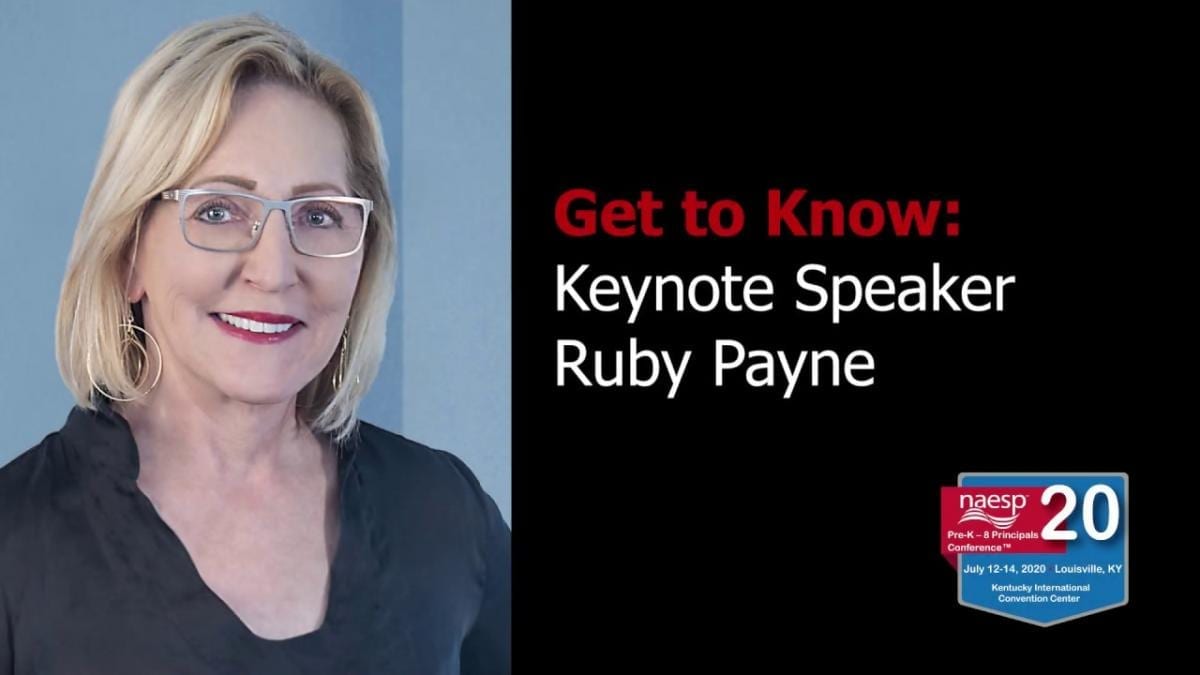
Champions for Education: Ruby Payne Edition
The passion that drives the NAESP Pre-K-8 Principals Conference keynote speakers will inspire you.
Topics: Equity and Diversity
The NAESP 2020 Pre-K-8 Principals Conference, July 12-14 in Louisville, Kentucky, is the only national elementary and middle-level conference focused on what principals should know and be able to do to drive student success. We’ve lined up topnotch keynote speakers—Ruby Payne and Baruti Kafele.
Over the next few months, we’re giving you the chance to get to know our speakers a little bit better. Find out what makes them passionate about education and where they see the future of education heading. Plus, they’ve shared with us their answers to some rapid-fire questions about what they wanted to be when they grew up, their go-to books, and more.
This edition features Ruby Payne, founder of aha! Process and an author, speaker, publisher, and career educator. Here are her views on addressing emotional poverty, discipline strategies, and which unconventional topic schools should be teaching.
What is emotional poverty? Emotional poverty is when the brain is unintegrated and unregulated, when the inner self is weak, the bonding and attachment is insecure, and the external environment tells you that you are “less than” and “separate from.”
Why aren’t current discipline strategies effective when addressing emotional issues? Many of our current discipline strategies are based upon the idea that the student is basically emotionally healthy and just needs readjustment. However, the emotional responses and behaviors that are occurring in schools now are based upon an emotional injury, which requires a different approach.
What’s the biggest issue facing school leaders today? The incredible demands that are placed upon teachers and students by federal and state policy, some of which are actually psychologically abusive. Kindergarten students should be learning through activity and play. The constant testing and measuring takes away from time to learn. The second issue that is facing many school leaders is the shortage of teachers, particularly in rural areas. The third is the emotional issues that some students and parents are bringing into the campus. The fourth issue is the amount of time that must be spent on compliance, regulatory, and legal issues.
Which educator had the most impact on you during your school years, and why did he or she leave a lasting impression? I was so fortunate to have several. I loved my second grade teacher. Her lipstick and nail polish always matched! When I was a consultant for a regional service center in Texas, I worked for an executive director who was phenomenal. I learned so much from him. He had the ability to identify talent in others and confront issues in a non-offensive way yet speak the truth. He genuinely liked people. He was gifted with political negotiation.
When you were a child, what did you want to be when you grew up? A teacher. Always a teacher. I would line up my dolls and play with them.
What was your favorite book as a child? As an adult? I loved to read. I did not have a favorite book. I loved mysteries and good literature and still do. I still read about 200-300 books a year. The recent book Educated really struck a chord with me. Probably my favorite book right now is 12 Rules for Life by Jordan Peterson.
What unconventional topic do you wish students could learn as a subject in school, and why? I wish we would teach students about food—cooking, baking, etc. It is such a fabulous way to learn math, but more important, it is a lifelong skill and understanding. It is a bonding activity. In the mid-1970s, three courses were taken out of high schools that have impacted our country significantly; we took out home and family living, personal finance, and food and nutrition. Those courses were replaced with STEM courses. The understanding was that the parents would teach those things to their children. Now, 45 years later, we are seeing the impact in America of not having those courses.
What She’ll Speak About at #NAESP20
Recognized internationally for her work, Payne has helped students and adults of all economic backgrounds achieve academic, professional, and personal success.
Payne will present an eye-opening keynote on schools trying to address emotional issues with discipline strategies and why it might not be working. Social and emotional learning programs are critical for addressing emotional challenges, but we must also rethink our discipline procedures and policies. Her keynote address will be based on her new book Emotional Poverty in All Demographics, exploring the concepts and providing understanding, tools, and strategies that are more effective that those currently in use in most classrooms.
To learn more about Payne, visit the conference website.
—
Copyright © 2020. National Association of Elementary School Principals. No part of the articles in NAESP magazines, newsletters, or website may be reproduced in any medium without the permission of the National Association of Elementary School Principals. For more information, view NAESP’s reprint policy.

